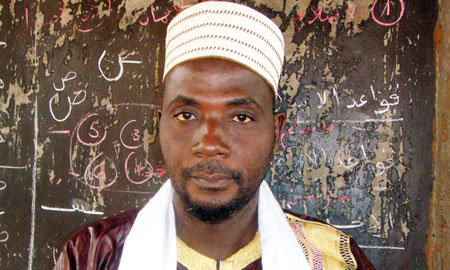The Health Policy Project ended in 2016. Work continued under Health Policy Plus (HP+) until 2022.
NEWS & VIEWS
Spreading the Light for Healthy Families
Imam institutes pre-marriage counseling to improve family health in Mali
September 15, 2011
 |
Through his participation in a training program for religious leaders, Imam Fousseyni’s inspiration continues to light the way for his followers and fellow imams on a path toward happy, healthy families in Mali.
|
When asked why he became interested in using religion to promote better health, Imam Fousseyni Doumbia responds without hesitation. “The importance of marriage and the family in Islam pushed me to do it.”
Imam Fousseyni is one of several Islamic leaders involved in a USAID-funded initiative that works with religious leaders to study the Koran and highlight passages that relate to promoting better health. In turn, imams develop messages rooted in Islam to inform their communities about the importance of taking care of their children, respecting women’s choices, and engaging men to make informed decisions about the health of their families.
Following his training, Imam Fousseyni has employed an innovative approach in wielding influence among his followers in Bamako to improve their well-being. Several years ago, Imam Fousseyni began to notice a rise in failing marriages, which he attributes to a lack of communication between couples, as well as people not fully understanding the importance of marriage and the family. In response, he instituted mandatory counseling sessions for men and women who want to be married in his mosque, alongside the couples’ friends and family members. There, he discusses Islam’s view of women’s and children’s rights, human rights, and the importance of love, tolerance, mutual respect, understanding, and communication.
Imam Fousseyni also teaches them that Islam does not prohibit birth spacing and advises men to be more involved in the health of the family while maintaining respect for women’s health choices. “The husband should not be a dictator, nor the wife an object,” insists Imam Fousseyni.
Over the past few years, Imam Fousseyni has advised 58 couples before performing their marriage ceremony. In that time, only one couple refused counseling. They were told to find another imam to marry them—a display of Imam Fousseyni’s deep conviction for the role of mutual understanding and healthy living in marriage.
His influence spreads beyond his neighborhood. Imam Fousseyni encourages his peers to hold similar meetings to discuss Islam’s view of marriage with engaged couples and advise them on how to raise a healthy family with each other.
He is also one of the principal instructors in a new program that trains religious leaders to become advocates for improved maternal and child health, with an aim to expand emergency healthcare services to all women and children in the south-western district of Kita. Under this project, supported by the Organization of Islamic Conference, United States Government, and the Government of Mali, with technical assistance from the Health Policy Project, Imam Fousseyni has helped train 87 Muslim religious leaders since May 2011.
One of his trainees, Imam Mahamadou Dembélé, has already become a shining example for practicing family planning in his village of Tambaga. After attending Imam Fousseyni’s workshop, Imam Dembélé led a community discussion on family planning and reproductive health. Subsequently, his wife was the first person in the group to adopt a family planning method, prompting others to follow their lead.
While much work remains to be done, Imam Fousseyni’s inspiration continues to light the way for his followers and fellow imams on a path toward happy, healthy families in Mali.
What's New
- Something to Build On: “Innovation Exchange” Celebrates the Health Policy Project’s Close and a New Beginning
- What Will it Take for Tanzania to Achieve ART Targets and Ensure Long-Term Sustainability of the HIV Response?
- Helping Kenya’s County Leaders Advocate for Increased Health Investments
- HPP Holds Working Meeting on Ensuring Responsible PEPFAR Transitions for Key Populations
- Health Policy Project Celebrates 2016 International Women's Day
- HPP Staff Participate in White House Conference on HIV Stigma Reduction

